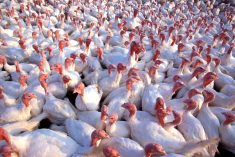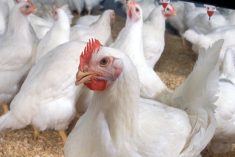A rural municipality north of Kitchener, Ont. wants the region’s growing farms to pay more of the cost to fix its crumbling roads, which could set a worrisome precedent for farmers.
The Township of Mapleton is struggling to find ways to pay for road upgrades and is proposing to add a development charge for agriculture buildings.
The predominantly rural municipality has a growing livestock sector. The bylaw proposes to reduce the exemption farms have traditionally received from development charges to 75 per cent. Most rural municipalities, including Mapleton, currently exempt farms from 100 per cent of development charges.
Read Also

Mexico agriculture secretary says still no date for restarting cattle exports to U.S.
Mexican Agriculture Minister Julio Berdegue said on Wednesday that Mexico and the United States have not yet set a date to resume Mexican cattle exports amid an outbreak of the flesh-eating screwworm parasite.
That could mean thousands of dollars more cost to farm expansion projects.
The bylaw will likely be voted on at a Township of Mapleton council meeting on Feb. 21. A public meeting is scheduled for Jan. 26.
“Council is finding that growth-related costs for roads are challenging and they are struggling with that,” says Brad McRoberts, chief administrative officer and clerk of the Township of Mapleton.
“Our roads are underdesigned for today’s use, today’s traffic and the weights on it.
“Agriculture has been very successful in this area. It has increased traffic on our roads. I believe council believes agriculture should pay for some of that growth in order to upgrade those roads.”
The passage of the Mapleton bylaw would “be unique to a certain degree,” says Ben Lefort, senior farm policy analyst, with the Ontario Federation of Agriculture.
The OFA says that of the hundreds of development charges bylaws, two-thirds of municipalities in Ontario exempt farm buildings from the charges. The rest of the municipalities are urban and don’t deal with farm buildings with the same frequency as rural municipalities.
“Where we do see it, it’s usually to focus on greenhouses,” Lefort said. “Especially where customers come in and shop and there is a retail part to it.”
Lefort questioned how Mapleton would be able to levy development charges on general farm building expansion as the provincial act that governs development charges stipulates that the charges have to be for specific, one-time infrastructure improvements such as adding a bridge or a turning lane to a road. Such work would rarely be needed for an addition to a farm.
However, McRoberts says that “development charges are the proper mechanism to address growth-related costs,” and the expansion of farms in the area creates more and heavier traffic on roads and as such farms should pay for some of the cost of upgrading roads.
There’s some confusion in the countryside, says McRoberts, that the fees would be charged on replacement barn construction — such as if a farmer replaced a current barn with a new barn. The fees would only apply to any expansion in capacity on a farm — whether it is a barn addition or the building of increased capacity when a barn is rebuilt.
The farming community and the Township of Mapleton have been in discussions over the proposal. Lefort says the OFA met with the township in November.
“It was a very positive meeting. It is not a confrontational issue,” he says.
A first public meeting in October had “respectful” representation from farmers, says McRoberts. The second public meeting will be held because a different section of the proposed bylaw relating to urban water rates was changed and so the bylaw had to go through the standard approval process again.
Lefort worries that the imposition of development fees in Mapleton will put farmers there at a competitive disadvantage, when nearby other townships, like Centre Wellington, won’t have such fees.
Township of Mapleton farmers will know the answer by late February.













